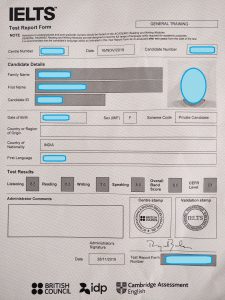What happens if you misunderstand or misread your IELTS cue card in Speaking Part 2? Does it mean you will get a lower score? How do the band scores relate to this?
Examples of Misunderstood IELTS Speaking Cue Cards
Below are some cue card topics and examples of how it is possible to misread or misunderstood them:
- A piece of equipment you use at home
- You talk about a tennis racket or football.
- A time someone helped you
- You talk about a time when you helped your friend.
- A foreign food you would like to eat
- You talk about a foreign food you don’t like.
- An achievement you celebrated
- You talk about your mother’s 60th birthday party.
- Something you borrowed
- You talk about an item you gave to a friend.
- An interesting old person
- You talk about someone who is 40 years old.
- A type of weather you like
- You talk about the sports you enjoy playing when it’s hot.
- A film you like
- You talk about a sport you enjoy.
All the examples above are from IELTS candidates who went slightly off topic and either didn’t read the cue card properly or misunderstood the topic.
The Impact of Misreading the IELTS Cue Card
Question to you: Which of the examples given above for the IELTS cue cards in speaking part 2 might be a problem or are they all ok?
Click below to reveal the answer:
ANSWEROK. Get ready to read and become more informed. There is no quick answer, only detailed explanations.
As you can see from the examples listed above on this page, all of them go off topic slightly. The reason being that someone in the test was so nervous that they misunderstood or didn’t read the cue card properly. It happens a lot in the speaking test.
There is NO marking criterion called Task Achievement in IELTS Speaking. Task Achievement or Task Response is part of the Writing Test marking, not part of the Speaking test marking. In Speaking, you are marked on:
- Fluency
- Grammar
- Vocabulary
- Pronunciation
Only your spoken English matters.
So, with the examples listed above, all examples from 1 to 7 are fine. The candidate has understood the main topic and stayed on the main topic. But they have missed specific details. In example 1, the topic is equipment and the specific detail is equipment in the home. In this case, the candidate didn’t read the card properly and only talked about equipment, missing any mention of “home”. This is not a problem. You won’t lose marks because of this. The examiner might draw your attention to this or might not. In number 5, the candidate has misunderstood the word “borrow” and talked about “lend”. This is very small vocabulary error and won’t have a big impact on your score for vocabulary. Even number 6 is fine. Some people think that being 40 years old is old, while others think that only 70 years and above is old. We all have different understandings of age and it’s ok.
However, the problem is number 8. In this situation the candidate hasn’t misread the cue card and hasn’t misunderstood it either. A film is 100% different to a sport. Even people with only simple English know the difference between a film and a sport. This candidate has actually changed the topic completely. This could be a serious problem. If the examiner thinks you have changed the topic because you prefer a different one that you prepared at home or one you have memorised, you might have your entire talk discounted. It won’t result in minus points because there are no minus points, but your talk might be seen as invalid and not counted towards your marks. You can’t change the topic and you can’t memorise answers.
Basically, if you misread the cue card, don’t worry about it. Keep talking. No matter the mistake, your talk will count towards your marks. Each word and sentence you say in the test will count towards your marks. But never try to completely change the topic on the cue card.
I hope this gives you more insight into how your talk in IELTS Speaking part 2 is marked.
All the best
Liz
Free Subscribe to get New Lessons & Tips by Email






